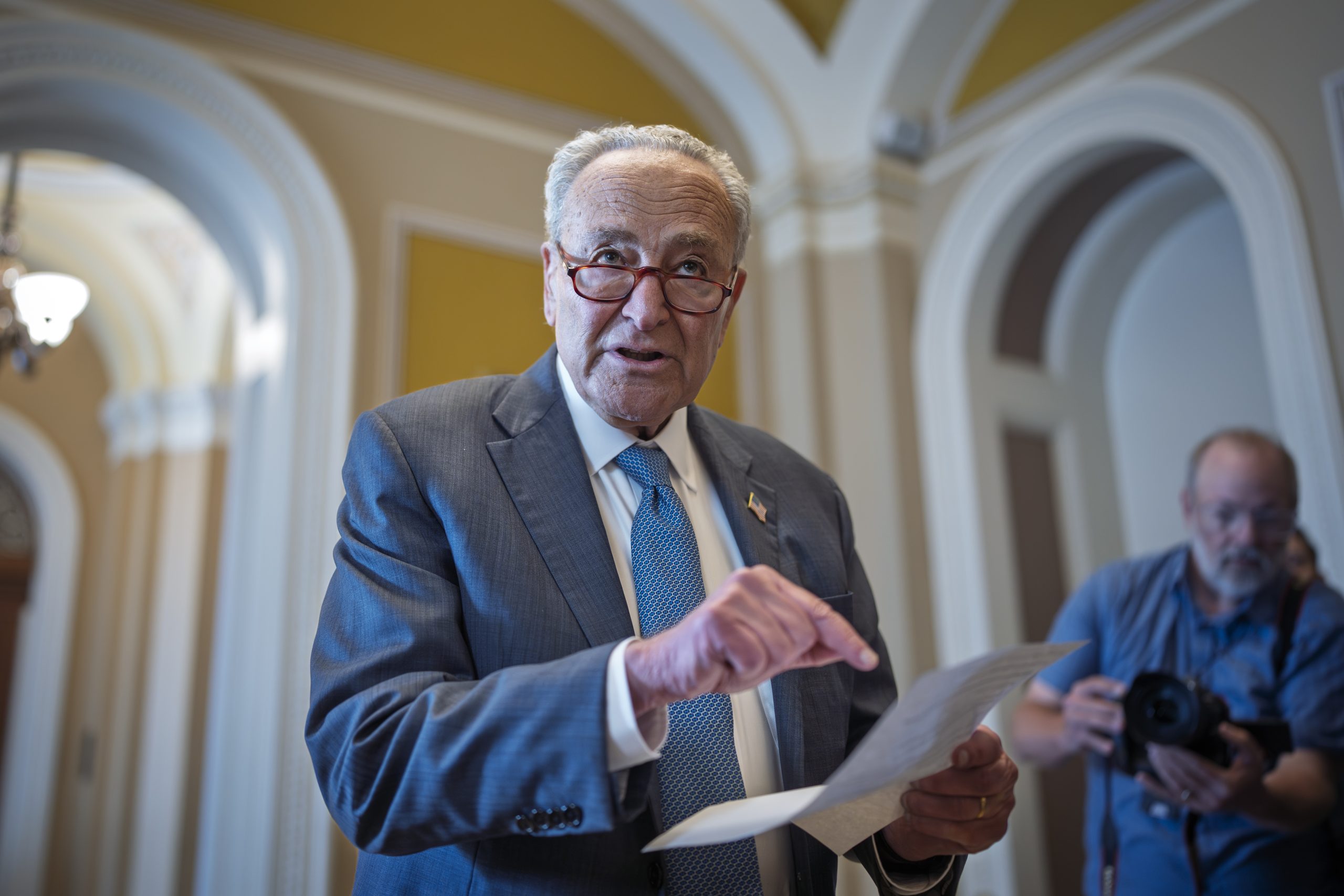Chuck Schumer is quietly turning his caucus toward a critical decision on how to handle a fall funding showdown, after he and Senate Democrats faced blistering criticism from the party’s base earlier this year.
As the chamber is set to vote Tuesday to tee up the first tranche of government funding bills, the Senate minority leader is holding discussions with his colleagues about what their strategy should be ahead of the Sept. 30 shutdown deadline.
Democrats are having behind-the-scenes conversations on this topic, including during a more than hour-long meeting last week. Schumer is expected to have more member-level discussions about the September roadmap over the next two weeks, and has been in close touch with Democrats on the Appropriations Committee. He is also meeting with House Democratic Leader Hakeem Jeffries on Tuesday to discuss funding endgame strategy, said three people granted anonymity to speak candidly.
Those private discussions come as Schumer has stopped short of threatening a shutdown publicly — even as he warns Republicans against pursuing GOP-only spending tactics.
“He is making recommendations and listening to our recommendations,” Sen. Tim Kaine (D-Va.) said about Schumer in an interview, adding that Democrats are “starting to have significant discussions within the caucus about Sept. 30 and the appropriations and [continuing resolution] process.”
Schumer’s decision to have conversations months in advance underscores what many in the caucus will acknowledge: Democrats are trying to be proactive by not waiting until they return from the weeks-long August recess to start feeling out their strategy, when they’ll have few legislative days left to figure out how to fund the government.
Ultimately, Schumer will make the final play call. But while Democrats want to see him find a strategy that unifies the party after facing intense criticism from the progressive base for helping advance a GOP-only bill earlier this year to avoid a shutdown, Democrats haven’t settled on a strategy. Schumer’s role, so far, is largely to facilitate the caucus’ private conversations and act as a soundboard as needed.
Sen. Jack Reed (D-R.I.), asked about what guidance Democrats are now hearing from Schumer, said the New Yorker was currently in “listening mode.”
“You know, generally, Chuck listens to people and then he typically tries to pull together the best thoughts of everyone for the policy, but he never ignores anyone,” Reed said.
Democrats are mulling a range of proposals internally with Schumer about what conditions they can place on Republicans in exchange for voting to move ahead with shutdown-averting legislation, according to two people granted anonymity to share private deliberations.
So far, Democrats have floated the idea of making Republicans agree to a deal on the budget process and specific policy concessions, or locking in a commitment from Senate Republicans that they will not support additional rescissions packages — potentially publicly or in writing.
There has been no agreement among Democrats, however, about what formal demands they will make of Senate Republicans, who need Democratic votes to reach a 60-vote threshold to advance a government funding bill. And, said the two people with knowledge of the conversations, it’s too soon to say which idea will end up as the lead contender.
Senate Democrats will face their first government funding decision Tuesday, with Republicans teeing up the first procedural vote on a package of government funding bills that have passed the Senate Appropriations Committee largely on a bipartisan basis.
Democrats appear to be leaning toward at least helping start debate on the package. But Schumer told his No. 2, Dick Durbin, that he wants to have a full caucus discussion Tuesday about how to handle that first tranche of funding measures before announcing a strategy, the Illinois Democrat said in an interview Monday.
Publicly, Schumer is trying to keep the pressure on Republicans, accusing Senate Majority Leader John Thune of “talking a bit out of both sides of his mouth” on government funding by talking up the importance of the normal appropriations process while also greenlighting efforts by the administration to clawback funding previously blessed by Congress.
“If Leader Thune wants to talk about bipartisanship, he should focus on keeping his side of the street clean first,” Schumer said.
He warned in a letter to his caucus earlier this month that Republicans shouldn’t bank on having help from Democrats on government funding if they pursue go-it-alone funding strategies like the rescissions package. But Schumer has also declined multiple times to discuss what the outcome would be for such actions, telling reporters late last week to ask Republicans if they were willing to stand up to White House budget director Russ Vought.
Across the Capitol, Jeffries is drawing his own line on government funding, saying Monday at a press conference, “it’s my expectation that if Republicans try to jam a highly partisan spending bill down the throats of the American people here in the house, we will reject it.”
But while the two New Yorkers face a similar dilemma, Schumer also faces a tougher task: House Republicans don’t need Democratic votes to pass legislation if they can achieve near-unity — a rare occurrence for the fractious conference but, as they have proven, not impossible. Schumer’s caucus, in contrast, plays a more decisive role given the need for 60 votes for the Senate to advance a funding bill to avoid a shutdown.
“Here’s the reality: we have to have a budget. We’ve got 47 votes, they’ve got 53,” said Sen. Peter Welch (D-Vt.), in an interview. “How we deal with that, when we’ve got 47-53, remains to be seen.”
Katherine Tully-McManus, Jennifer Scholtes and Nicholas Wu contributed to this report.



















